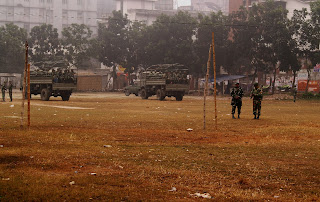The State of Emergency is still in place and we are still waiting for an announcement from the (new) interim Government about its aims and intentions regarding the election. In ten days, no statements have been made and speculation has been rife. At the same time, the human rights of people are being continually retracted. The police and army now have the right to arrest anyone at any time for any reason; they also may enter any building at any time for any reason without a warrant and effect arrests therein. The private televisions are banned from playing any news coverage expect that supplied by the state media. Newspapers are not permitted to question the actions of the interim government: those that fail to self-censor will face significant problems.
However, despite these punitive measures (done in the name of democracy, in the best American traditions), many have welcomed them, including Mohammed Yunus, the 2006 Nobel Peace Prize Winner and all round Bangladeshi hero, who seems to support the idea that an army-backed, extra-constitutional government is a good idea. The problem is that the politicians and the parties have been so corrupt and so manipulative, that such a view gets a great deal of support and is hard to dispute.
Bangladesh has descended into a ridiculous mess from which there seems to be no real solution. Either we will see truly open and fair elections, maybe in April or May, or there will be a prolonged suspension of democracy and a de facto military takeover. It should be noted that former military leader HM Ershad, deposed in 1990, has just avoided a prison sentence for corruption activities and has a new party that is growing in strength. Perhaps him, or someone like him, will make the breakthrough.
For us, however, the city is reasonably normal (inasmuch as this city has a state of normality). I am about to start a photographic project as part of our livelihoods programmes, looking at the relationships between rickshaw pullers and society at large. Our main argument is that rickshaws should not be banned but conditions of work must change. There should be a book out of it, and you can all buy a copy.
Dhaka remains a city in which it is hard to find entertainment, but a VSO badminton tournament has proved to be a major draw. Unfortunately, my partner Marufa (a VSOB programme co-ordinator) and I have played two and lost two. We are hoping to avoid the wooden spoon from our last two games. Badminton is about as energetic as most Bengalis get, although the cricket season has just started and there are Dhaka league matches played outside our flat, so a few more of them are running.
Finally, I spent an evening with Michelle’s Dad who was here visiting and met some of his family in Dhaka, who live in a quite amazing house in the plush parts of Ramna Park. The Chief Justice and other luminaries all share the street, so it’s a bit like living in Temple or Lincoln’s Inn or some other barrister locality: not typical Bangladesh. It was good to get some contacts here though, and some home cooked Bengali food.
However, despite these punitive measures (done in the name of democracy, in the best American traditions), many have welcomed them, including Mohammed Yunus, the 2006 Nobel Peace Prize Winner and all round Bangladeshi hero, who seems to support the idea that an army-backed, extra-constitutional government is a good idea. The problem is that the politicians and the parties have been so corrupt and so manipulative, that such a view gets a great deal of support and is hard to dispute.
Bangladesh has descended into a ridiculous mess from which there seems to be no real solution. Either we will see truly open and fair elections, maybe in April or May, or there will be a prolonged suspension of democracy and a de facto military takeover. It should be noted that former military leader HM Ershad, deposed in 1990, has just avoided a prison sentence for corruption activities and has a new party that is growing in strength. Perhaps him, or someone like him, will make the breakthrough.
For us, however, the city is reasonably normal (inasmuch as this city has a state of normality). I am about to start a photographic project as part of our livelihoods programmes, looking at the relationships between rickshaw pullers and society at large. Our main argument is that rickshaws should not be banned but conditions of work must change. There should be a book out of it, and you can all buy a copy.
Dhaka remains a city in which it is hard to find entertainment, but a VSO badminton tournament has proved to be a major draw. Unfortunately, my partner Marufa (a VSOB programme co-ordinator) and I have played two and lost two. We are hoping to avoid the wooden spoon from our last two games. Badminton is about as energetic as most Bengalis get, although the cricket season has just started and there are Dhaka league matches played outside our flat, so a few more of them are running.
Finally, I spent an evening with Michelle’s Dad who was here visiting and met some of his family in Dhaka, who live in a quite amazing house in the plush parts of Ramna Park. The Chief Justice and other luminaries all share the street, so it’s a bit like living in Temple or Lincoln’s Inn or some other barrister locality: not typical Bangladesh. It was good to get some contacts here though, and some home cooked Bengali food.







